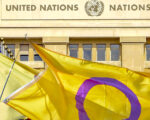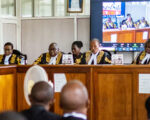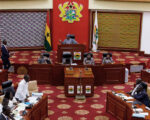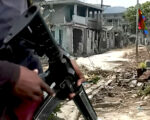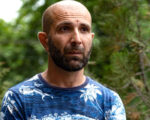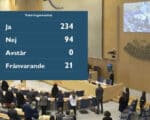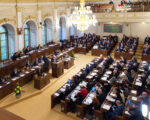>> Politics on full display at Buenos Aires Pride
[spacer]
Si l’événement était axé sur le manque de protection des trans – accès aux services essentiels de santé et les discriminations à l’embauche et sur l’attribution notamment de logement – un seul mot d’ordre toutefois cette année pour la 24ème édition de la Marche des fiertés de Buenos Aires : « Oui à l’amour, non à Macri », pouvait-on lire sur les lèvres et les pancartes des manifestants.
À quelques deux semaines du second tour de la présidentielle argentine, la communauté LGBT aura donc exprimé sa crainte devant la popularité grandissante de Mauricio Macri, le candidat conservateur, qui considère l’homosexualité comme une maladie.
Crédité par les sondeurs d’environ 30 % des intentions de vote, l’élu de 56 ans, qui se positionne comme un candidat de rupture après 12 ans de présidence de Nestor et Cristina Kirchner, a déjà rassemblé au premier tour, ce 25 octobre, 34 % des suffrages, tout près du score du candidat du pouvoir sortant, Daniel Scioli, qui était pourtant le favori du scrutin. Et, sur les réseaux sociaux, ses partisans occupent le terrain.
« Aujourd’hui, les personnes LGBT sont enfin considérées comme des gens normaux. Et, on ne peut que remercier le gouvernement actuel pour tous ces droits que nous avons acquis. Avant de voter, il faut se poser une question : est-ce qu’on va faire un bond en arrière et être considérés comme de la merde, comme des gens malades ? », s’offusque un militant.
Entre un parti autrefois populaire qui s’effondre « sous le poids de son séjour prolongé au pouvoir », et un candidat qui pense que l’homosexualité est une forme de maladie mentale ?!
[spacer]
[spacer]
Pionnière dans la reconnaissance du mariage des couples de même sexe dès 2010, accordant en 2012 la possibilité aux transgenres de déclarer librement leur sexe « ressenti », rappelons que dans la très catholique Amérique latine, l’Argentine fait figure de proue sur la question des minorités.
Le pays vient d’ailleurs de supprimer l’interdiction faite aux homosexuels de donner leur sang. Et pour compléter l’arsenal législatif destiné à limiter, au moins officiellement, la discrimination et l’ostracisation des personnes différentes, le gouvernement fait appliquer depuis le printemps 2015, une réglementation permettant aux Argentins qui le désirent de changer de sexe gratuitement, pour faciliter l’adéquation du genre ressenti avec l’apparence physique. Une faculté pour l’instant unique sur le continent sud-américain. Des droits précieux donc que n’ont pas manqué de rappeler les manifestants pour inciter à la mobilisation.
Joëlle Berthout
StopHomophobie
[spacer]
>> Buenos Aires held its 24th annual pride festival and parade yesterday, with a massive gathering of people convening in Plaza de Mayo; throwing a colorful, political party; and marching/dancing their way down the two kilometer stretch between La Casa Rosada (the Pink House, Argentina’s equivalent of the White House) and Congreso, which houses the country’s legislative body.
Argentina’s LGBT community has seen a number of advances in recent years, most notably seeing marriage equality become the law of the land in 2010 (a move that then-Archbishop Jorge Bergoglio decried as a move by the “father of lies,” by which he meant Satan, designed to “seriously harm the family”). However, there are still numerous areas in which LGBT people, and women more generally, face discrimination and violence that the movement sought to address. This being the case, those in attendance yesterday weren’t just there for good music and 20 peso beers (the official exchange rate is about ten pesos to the dollar). Yesterday’s event had a clear official agenda — along with an even clearer unofficial agenda — for advancing equality in Argentina.
First and foremost, the event focused on the lack of comprehensive protections for Argentina’s trans community, which faces barriers to access in essential health services and outright discrimination in hiring and housing. In addition, the event organizers officially called for legalized abortions and the public production of Misoprostol, full separation of church and state, legalized marijuana and an end to systemic, patriarchal violence.
But while Marci’s homophobic and transphobic past earned him unanimous opposition at the event, that didn’t necessarily translate into corresponding support for Scioli. As the New Left Socialist Workers Movement (Movimento Socialista de los Trabajadores, or MST) wrote in a pamphlet distributed at the event, “Scioli and Macri polarize and claim the vote is a question of life and death. But this isn’t the case. Respecting distinct opinions, we feel that neither of them has earned anything. Both govern for the corporations. Both are preparing devaluation and setting (of currency prices), and both are firmly aligned with the Pope and the Church.” This being the case, they wrote, voters should votar en blanco, or vote blank, showing up at the polls and casting a non-ballot as protest.
Multiple other organizations and political parties at the event indicated that they would follow suit.
The MST’s flyer illustrates the confounding dynamic in the runoff election. The Front for Victory has presided over a number of social advances: in addition to marriage equality, gays and lesbians gained the right to serve openly in the military in 2009. Per a 2012 law, public and private health insurance plans are required to cover gender reassignment surgery, and judicial approval is no longer required in order to make changes to gender, image or birth name on civil registries. On the non-LGBT-specific front, the voting age was recently lowered to 16. FpV has promised to continue pushing for social progress should Scioli win later this month.
But at the same time, Argentina is in a period of double-digit inflation and the FpV has been rocked by numerous scandals. And not just ridiculous gaffes, like the time President Cristina Fernández de Kirchner sent a flagrantly racist tweet making fun of the way people from China speak during trade meetings with the Chinese government. No, we’re talking drug trafficking and government investigators dropping dead under suspicious circumstances, on top of juking government data and directing public policy for personal financial gain. FpV has governed the country since 2003. While they have maintained credit during the campaign season for bringing Argentina out of an economic depression in the early 2000’s and passing progressive social policies, the combination of scandals and economic stagnation of late has led voters to see them, to an increasing degree, as corrupt and inefficient.
This frustration is the main reason why they didn’t win the election outright after the first round of voting. And since the first round, leaders of multiple opposition parties who you would expect to line up behind FpV — from third-place finisher and fellow Peronist Sergio Massa to the Progressive Front’s Margarita Stolbizer — have called on their supporters to oppose Scioli and FpV, while not explicitly endorsing Macri, the conservative challenger. While the endorsements of party leaders aren’t a clear indication as to how their supporters will cast their ballots — Argentina is still a solidly leftist country, even if its leftist leaders say it’s OK to vote for the right-winger — it does show just how badly disliked the FpV has become.
This being the case, the MST’s call for voting blank doesn’t seem like that bad of an idea. On the one hand you’ve got a once-popular party collapsing under the weight of its extended stay in power, and on the other hand you’ve got a candidate who thinks that homosexuality is a form of mental illness. While the scene at Buenos Aires Pride yesterday was all kinds of festive, it was clear that once the party ended, everyone was headed straight back to work fighting to fix a system that isn’t working for them.









